
The set of Fat Ham at San Francisco Playhouse
I saw my second opening of Fat Ham in 11 days when San Francisco Playhouse unveiled its version of this wonderously fun, important play. I was tempted to say the exact same things about the different aspects and parts of the play here as I did in my review of the Oregon Shakespeare Festival’s version. All I would need to do is change the names of the actors playing the roles and update the photos with ones from the SF Playhouse website.
But the quality and subtle differences between the productions demand that I actually do some more work and write about the feelings and thoughts that came from SF Playhouse’s evening.
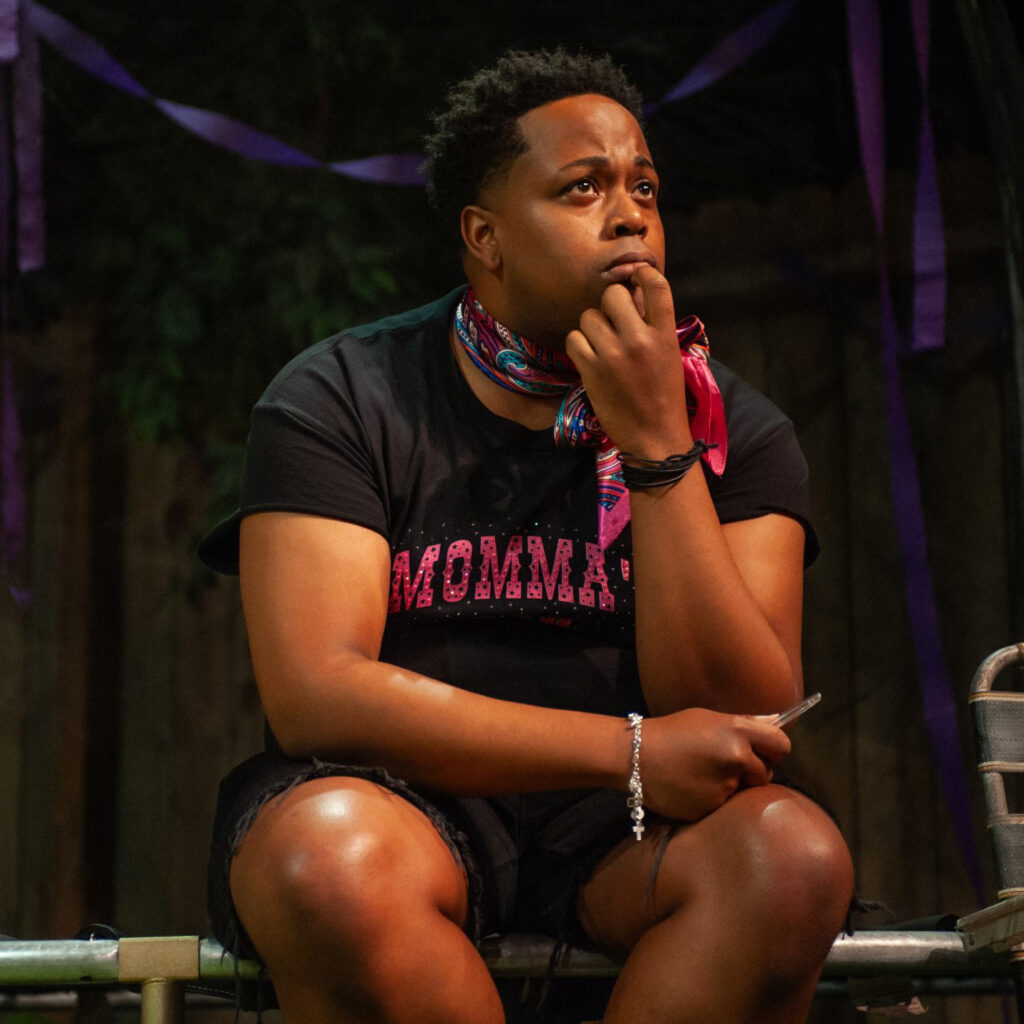
Juicy (Devin A. Cunningham), contemplating
Both productions do a truly excellent job of presenting this modern, southern-US-based, Black-family-focused, transmorgrafied version of Shakespeare’s Hamlet.
Just like the original, the Fat Ham story starts with Juicy’s (Devin A. Cunningham) emotional turmoil facing his mother’s, Tedra’s (Jenn Stephens) marriage to his uncle just after his father, Pap (Ron Chapman) dies. The play doesn’t have the lines “The funeral-baked meats coldly furnish forth the marriage table.” But, the set up for the Shakespeare text is so clear that I found myself thinking those words.
In fact, throughout Fat Ham there are moments when a character delivers a line or a whole soloquiy actually from Hamlet. At other times I was sure that they were going to use the original Shakespeare but they don’t. It was a marvelous frustration of not knowing if Shakespeare was coming or not!
As Juicy is musing with Tio (Jordan Covington) — think HoraTIO – Pap appears as a ghost and tells Juicy that his uncle Rev (also Ron Chapman) paid for him to be killed. The ghost urges Juicy — who has been decorating the back yard for the wedding celebration – to avenge his murder.
So the actors and the audience know the task in front of them. They will be dealing with the family drama stemming from Rev’s murderous act.
In both plays we watch our hero figuring out if his uncle really killed his father. If he did, there clearly will be revenge, BUT (a big BUT) FatHam takes a turn towards acceptance and love.
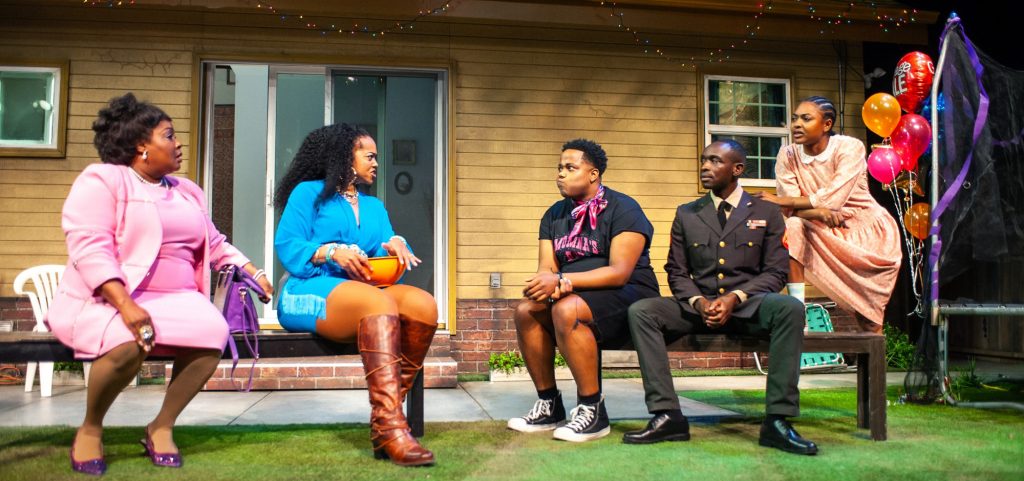
Rabby, Tedra, Juicy, Larry, and Opal
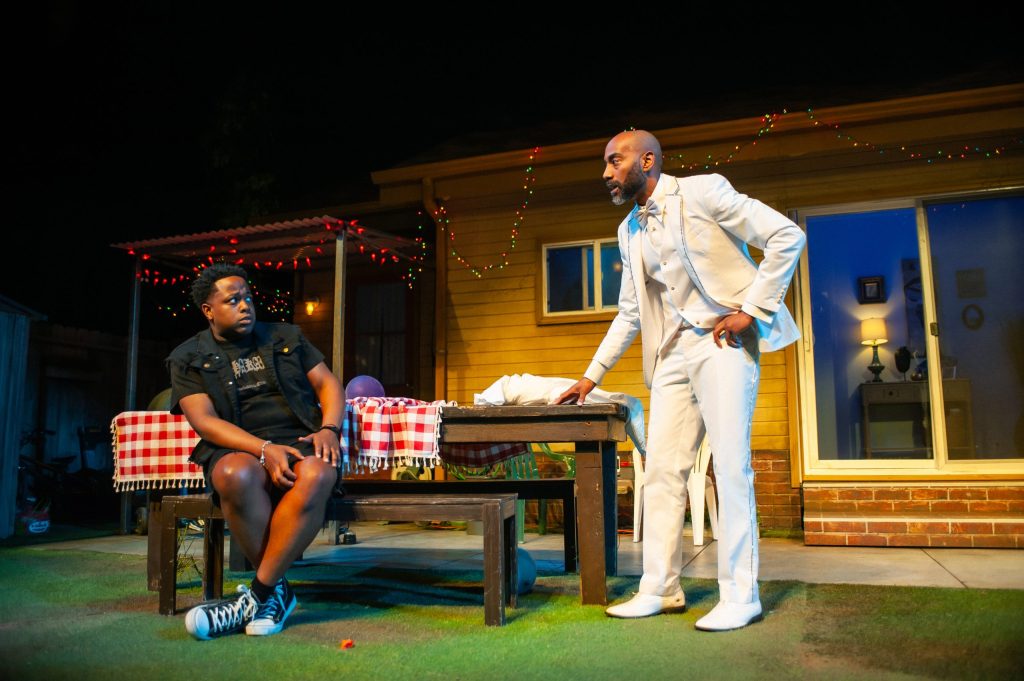
Juicy is startled by the ghost of Pap
The modern day characters find themselves exploring their own feelings and characteristics others might consider weaknesses. This analysis shifts the goal from simple retribution toward a more complex one of growth and understanding.
SF Playhouse’s cast is spectacular in making the characters nuanced and real despite the text often being happily over the top. On opening night I felt Juicy’s apprehension about his internal discoveries. His lines obviously dealt with uncertainties and coping with his non-standard ticks. Any actor delivering the words couldn’t help but communicate the swirl going on in Juicy’s head. However, at SF Playhouse I sensed that Juicy wasn’t just running through the words but he was truly expressing his emotions.
Throughout the evening Cunningham’s Juicy was a standout. His coping with his and others’ coming out adventures was determined yet full of believable conflict. And, I loved when he repeatedly broke the fourth wall for commentary, or best of all, to deliver a genuine Shakespeare speech.
Larry (Samuel Ademola) gets my vote for most improved performance from dress rehearsal to opening night. At opening he was perfect. He was introduced as a reserved military man with discipline, but he smiled and had a quiet chuckle. This is in contrast to his performance at dress when he was 100% uptight. When he transformed later in the play, he emoted complete comfortableness with his true self. Not only was he more relaxed, his wardrobe shifted from high heels to dancing heels. That change allowed him to look like he enjoyed his final moments on stage instead of how a week earlier he looked stiff, rigid, and about to fall over.
Tio also reached me deeper than he had in rehearsal. He always is energetic, funny, meaningful, and… did I say energetic? Now that the play is live he also has deepened and gives more emotional solidness to his ridiculous stories. He is so great to watch on stage that I am not sure I tracked his dialogue closely at times, but that’s on me. Tio is wonderful.
Opal (not Ophelia) is an excellent, consistent, in-your-face-but-amusing part of the family funeral gathering. I liked the adaption of the special relationship that Hamlet and Ophelia had to Juicy’s and Opal’s interaction. Unlike Hamlet’s friend, Juicy’s compatriot is anything but vague and undecided. Her self-knowledge is laudable and the ways others in the family deal with Opal’s goals and decisions happily reinforce the positive communal feelings of the barbeque.
I’m giving short shrift to characters Tedra, Rabby (Phaedra Tillery-Boughton), and Rev/Pap. If the overall production was not as good as it is, each would deserve paragraphs of descriptive happiness. As it is, they are “merely” integral parts of excellence. I particularly liked the sassiness of Rabby when she reveals some of her past. The physical comedy of both Tedra and Rev/Pap matched perfectly the jauntiness of their dialogue. Tedra in turquoise and Pap in ghostly white… unforgettable… for very different reasons!
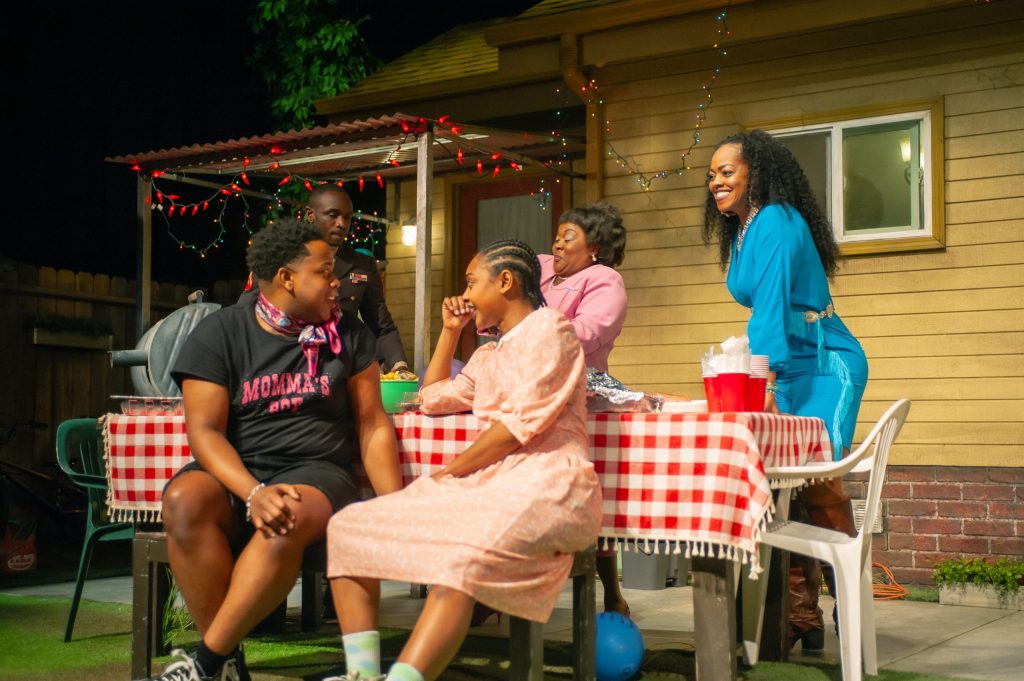
Juicy, Larry, Opal, Rabby, and Tedra chat at the barbecue

Director Margo Hall on Opening Night
The whole cast gave depth to outrageousness. And, even though we depart of a traditional Shakespearian ending – and no one gets to say, “Go, bid the soldiers shoot!” at the end of the play I felt that I’d seen a complete family story that could be told to future generations.
A couple extra notes. First, we heard the director say that she and the cast like it when the audience engages in call-and-response. So, if a character should ask, “What should I do? Leave him?” It would be okay to shout from your seat, “YES!” In other words, don’t be an old, white reserved audience and instead let loose.
Second, it was fun to hear that the SF Playhouse and Oregon Shakespeare Festival directors of Fat Ham know each other and actually had a long phone call comparing notes in the weeks before both houses went live. SF’s director, Margo Hall, taught theater to OSF’s director Elizabeth Carter. I thought that both directors approached the play with a very similar style – which I loved. The look of the set, the pacing, lighting, and tone of the characters matched up in a positive way.
There is enough tragic revenge in today’s world. I recommend that folks see FatHam and adopt the supportive community outlook on life.
Excellent pace, design, nuance, and, of course, acting earns at rating of:


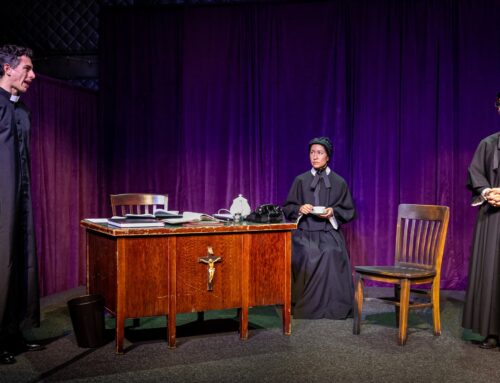


Leave A Comment